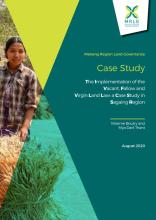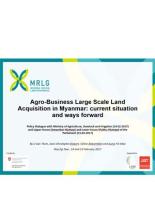Land Library Search
Through our robust search engine, you can search for any item of the over 73,000 highly curated resources in the Land Library.
If you would like to find an overview of what is possible, feel free to peruse the Search Guide.
/ library resources
Showing items 1 through 9 of 30.This Case Study looks at the implementation of the Vacant, Fallow and Virgin Lands Management Law (VFV Law) in seven villages in Sagaing Region, to assess the practices on the ground and how the law impacts the land tenure security of smallholder farmers.
The Mekong Region Land Governance (MRLG) project, MLIKE (Mekong Land Information and Knowledge Exchange), and the Land Portal co-facilitated an online dialogue on “Responsible Large Scale Agricultural Investments in the Mekong Region” on 09-27 October 2017.
Rubber prices in northern Laos have fallen significantly over the last few years, eroding much of the initial enthusiasm of both farmers and government officials about rubber providing a way out of poverty for poor upland farmers.
This presentation summarizes an on-going research in Myanmar, carried out by renowned agricultural specialist U San Thein and a team of experts, with the support of MRLG.
This video is part of one of the major activities of the L&A initiative “Collective Learning on Land Conflict Resolution” in Cambodia. It shows how important the solidarity of villagers is important to prevent land grabbing.
Sierra Leone is one of the least developed countries in the world and is still recovering from a civil war that ended in 2002.
The buying up of farmland by international investors is viewed highly critically. However, sweeping judgements could be inappropriate, as our author demonstrates with survey results from Ethiopia and Uganda.
In Cambodia, the majority of the population is still composed of smallholder family farmers. 54% of the total labour force is employed in agriculture. They have access to 3.6 million ha of land, representing 19% of the country’s total land.
In the Mekong region, conflicts between local communities and large scale land concessions are widespread. They are often difficult to solve.









